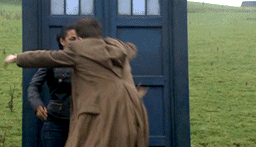If you're a writer just starting out, that can be really tough. I know it was for me. It took me years to separate my ideas from the books I read, to move into a place where my inspiration became original and personal, instead of just me recycling the stories and characters I read about. This isn't a bad thing--this imitation of other writers. It's how we learn, and I believe most writers start off that way.
For example, my first novel (which I wrote at age 13, when I was in the height of this story-stealing phase) actually started out as fan fiction of the Redwall series by Brian Jacques. When I realized I couldn't really a call a story my own when I was basically copying another writer's world, I changed the species of my characters from squirrels to humans, and thought that in doing so I had broken free into new original territory. I hadn't. In fact, when I thrust that poorly written and decidedly horrid manuscript onto some of my friends after I'd finished it, begging them for feedback, more than one handed it back saying, "You know, you write a lot like Brian Jacques. Ever hear of him?" Palm to the face. Palm. To. The. Face. Apparently, changing the species of my cast wasn't enough to qualify me for true originality. But I would learn.
So anyway, all this to say, I've come a long way from that sad, beloved first novel in terms of ideas and inspiration and finding my own unique voice. If you're a young or newly developing writer, here are some ways you can begin to do that too, and places where you might draw your inspiration. Then, armed like Benjamin Franklin out to catch a lightning bolt, you can set out to catch your story.
Four Places Where Inspiration Might Strike
1
What interests you?
I sometimes miss this as I'm writing. For example, I need my character (oh, let's call her Kate) to have a little more backstory to her. I want her to play some sport at school, perhaps. My natural inclination is to make my characters different from me (I don't know why) so I'd likely assign her to something like basketball or lacrosse, two sports about which I know nothing. Now, I could take the time to learn, to research these things--and that's good. That's fine. You can totally do that. Writing should stretch you and bring you to new places, learning new information. But if I stop and just think for a minute, I'll realize that making Kate a soccer player will be a much stronger move. I'm a soccer player. I adore soccer. I'm one of those scream-at-the-television kind of soccer fans. So when I plop Kate down on the soccer pitch, I suddenly feel more passionate about her character, because I can relate to her passion for The Beautiful Game. I learn things about her I didn't know before--that she's highly competitive, that maybe she loses her head a bit in the heat of the game, that she's fiercely loyal to her teammates. And I know these things because when I think about soccer, I feel them myself or have known teammates who were like this. When I think about lacrosse or basketball, I feel nothing. Blah. Whatever.
By simply going in the direction of what interests me, I find so much more emotion, experience, and passion to draw from as I write, whether it's something as small as adding another hobby to my character's repertoire or coming up with a completely new, big story idea.
I mean, look how passionate soccer players are. Awesome.
2
The Magic Question
"What if _________?"
I love this. It's so open, so filled with possibility. What if the world weren't actually made of rock and dirt, but it's actually some giant sleeping creature that starts to wake up? What if when you take a photograph you're actually creating a new alternate reality that begins inside that picture? What if my long-lost grandmother suddenly appeared and told me I was the princess of a tiny, wealthy kingdom in Europe? Oh, wait... You get the idea.
The key is to hold nothing back. Let it all spill out--the silly ideas, the impossible ideas, the ideas that will never go anywhere. This can be done as a kind of exercise in creativity. You have to be willing to sound a bit ridiculous, a little crazy. But there are no truly bad ideas or stupid ideas--they're just ideas. They're not even stories yet. But they could be--somewhere in the dozens and dozens of What if? questions you pour out, there just might be a golden ticket to story inspiration.
3
What terrifies you?
Use your fears to bring real tension to your story. If you write about something you are afraid of, it will be much easier and more organic to translate that fear into your writing.
For example, one of my fears is death, and especially of losing someone I love. This is a fear I drew on in writing ORIGIN; it's a topic Pia contemplates to some depth. I relate to her through her fear of losing her loved ones more than anything else, because I understand it.
Building real, personal fears into your story not only makes it relatable to you, but probably to a lot of your readers as well. I'd say most of our fears are pretty commonly held by the majority of people--death, darkness, loneliness, etc. Fear makes your characters human. It makes them vulnerable, gives them that all-important Achilles heel. Once you know their deepest fear, you can exploit it--twist the knife in the heart, so to speak. Pry into their fear and force them to face it in a dramatic way.
4
History, Science, Art
Mary Oliver said, "I think our duty as writers begins not with our own feelings, but with the power of observing." Exposing yourself to art, to history, science, nature, whatever, can be a great way to find a story. The key here is to always be alert.
Keep the Magic Question always in your pocket. No, scratch that. Don't keep it in your pocket--wear it like a pair of glasses, through which you're always seeing the story stuff of the world. Look at history this way--What if Abraham Lincoln were really a vampire slayer? Look at science. What if, ten years from now, invisibility technology becomes viable? And art. One of my favorites! (Hence my massive Pinterest collection). Photography, painting, sculptures, gosh--did you know they've got whole museums packed with the stuff? Good art not only comes from good inspiration--it's also becomes inspiring to others. And there's bookoos of it out there, so you've got no excuse, really, to not be inspired--especially if, like the good little writer you are, you're wearing your MQ glasses.
































.jpeg)
.jpeg)
.jpeg)






.JPG)
.JPG)
.JPG)
.JPG)
.JPG)
.JPG)
.JPG)
.JPG)
.JPG)
.JPG)
.JPG)
.JPG)